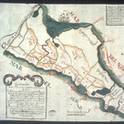The law of the South American states with reference to nationality of origin remains to be noticed. Sir Alexander Cockburn, Nationality: or, The law relating to subjects and aliens, considered with a view to future legislation (London, W. Ridgway, 1869), 17. In December 1841, voters in Sonsonate (El Salvador) elected Frenchman and long-time resident, Luis Bertrand Save, as their alcalde, or municipal judge, for 1842. The governor insisted that Save accept the office. However, Save convinced El Salvador's president that he should not serve since he was not a citizen of the country, citing French and Salvadoran laws to back up his argument. French law mattered because Save could lose his qualité de français, or "Frenchness," by holding office in a foreign government, and Salvadoran laws limited office-holding to its own citizens. In 1843, Save was again elected alcalde and again protested because "the law requires for these positions that it is indispensable that the elected be a citizen of the country. While I am a vecino (for I live in Sonsonate), I am not a ciudadano (citizen), and as a foreigner,...
- political history,
- citizenship,
- diplomatic history,
- nineteenth century,
- Central America,
- El Salvador,
- Nicaragua
Available at: http://works.bepress.com/jordana_dym/13/
